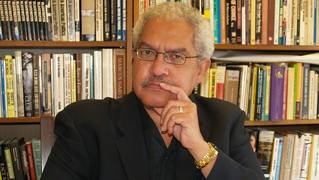
Topics
We go to the steps of the University of Michigan student union and hear the reaction. Students hail the decision as the most important victory in affirmative action in 25 years. Democracy Now! then hosts a roundtable discussion with a leading U. Michigan lawyer and an opponent of affirmative action, leading race critic Manning Marable argues the Supreme Court backed affirmative action to help the U.S. compete under globalized capitalism–not to make reparation or to level the playing field
The Supreme Court yesterday upheld affirmative action in higher education.
The Court’s two landmark rulings were the most important rulings on affirmative action in a quarter of a century.
By a vote of 5 to 4, the high court ruled the University of Michigan Law School’s admission policy is legal.
Justice Sandra Day O’Connor wrote for the majority: “In order to cultivate a set of leaders with legitimacy in the eyes of the citizenry, it is necessary that the path to leadership be visibly open to talented and qualified individuals of every race and ethnicity.” She wrote, “Effective participation by members of all racial and ethnic groups in the civil life of our nation is essential if the dream of one nation, indivisible, is to be realized.”
O’Connor’s majority opinion is based on the idea of “compelling state interest” in diversity. That is, the majority court did not support affirmative action because it is a way of redressing past oppression and injustice, or because it is a way of leveling the socio-economic playing field. Rather, the justices backed it because they felt it is in the interest of the state, that college campuses and professional schools achieve diversity. This idea harkens back to the 1978 Bakke case, when Justice Lewis Powell, Jr. ruled there is a “compelling state interest” in racial diversity, and permitted the use of race as one “plus factor.”
Proponents of affirmative action are hailing the court’s decision as a major victory. Back in the 1978 Bakke case, Powell was the lone author of the controlling opinion in the case. The Supreme Court itself appeared to undermine his position in subsequent rulings over the years, and some lower federal courts flat out rejected the idea. With yesterday’s ruling, the idea has been firmly entrenched in U.S. jurisprudence, by five Supreme Court justices.
Big business, labor, major colleges, and the military filed friend-of-the-court briefs urging the court to uphold affirmative action, including General Motors, the AFL-CIO, the Massachusetts Institute of Technology and retired Gen. H. Norman Schwarzkopf. Justice O’Connor cited these views, writing for the majority: “Major American businesses have made clear that the skills needed in today’s increasingly global marketplace can only be developed through exposure to widely diverse people, cultures, ideas and viewpoints.” She wrote that high-ranking retired officers and civilian leaders of the U.S. military linked diversity among the officer corps to the safety of the nation.
In the second case, the court ruled 6 to 3 against the University of Michigan’s undergraduate admissions policy. The undergraduate school awards 20 points on a scale of 150 to an applicant if she or he is a person of color. Fixed numbers of points are also awarded for other factors, including alumni connections. Chief Justice William Rehnquist, writing for the majority, rejected the point system because race factors in a non-individual, mechanical way. But the justices affirmed that race can be used as a factor in admissions.
Taken together, the rulings are a slap in the face to President Bush. The Bush administration had intervened in the case, asking the court to invalidate both Michigan programs. President Bush had personally announced he was against the university’s affirmative action programs.
But yesterday, Bush issued a statement praising the court for “recognizing the value of diversity on our nation’s campuses.” He said, “I look forward to the day when America will truly be a color-blind society.”
- Agnes Aleobua,University of Michigan student, and organizer with the activist group, By Any Means Necessary. She was named defendant in Grutter v. Bollinger. She became a defendant while a Detroit public school student in high school; beneficiary of affirmative action. Organized University of Michigan student contingent for the April 1st march.
Yesterday, jubilant students gathered on the steps of the University of Michigan student union after hearing the decision. We spoke with some of them there:
- Students react to historic Supreme Court Ruling, June 23, 2003:
- Jodi Masley, graduate of the University of Michigan, U of Michigan law student, student intervenor in the case, and a founding member of Law Students for Affirmative action. She says she herself benefited from affirmative action as a poor, white woman.
- Ebony Ross, 15-year old African-American high school student from Detroit
- Ronald Cruz, Philippine-American student, University of California at Berkeley
Related Link:
We’ve just heard the reaction of students at the University of Michigan to the news that the Supreme Court has upheld affirmative action.
Right now, a roundtable discussion, with Miranda Massie, lead attorney for the student defenders in the University of Michigan Law School Case, affirmative action opponent Edward Blum with the Center for Equal Opportunity, and leading race critic and historian Manning Marable.
- Miranda Massie, lead attorney for the student defenders in the University of Michigan Law School Case.
- Edward Blum, Senior Fellow for the Center for Equal Opportunity
- Manning Marable, Professor of History and Political Science, and Public Affairs at Columbia University, and founding Director of the Institute for Research in African-American Studies. His most recent publications include Black Leadership (1998), Black Liberation in Conservative America (1997), Dispatches from the Ebony Tower edited volume (2000) and Let Nobody Turn Us Around, edited with Leith Mullings (2000).
Links:
Manning Marable’s essay “G.W. Bush: Affirmative Action Baby”












Media Options